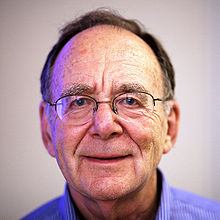Richard Karp
| Richard Manning Karp | |
|---|---|

Richard Karp giving a talk at the EPFL on 13th of July 2009
|
|
| Born |
January 3, 1935 Boston, Massachusetts |
| Nationality | American |
| Fields | Computer Science |
| Institutions |
University of California, Berkeley IBM |
| Alma mater | Harvard University |
| Thesis | Some Applications of Logical Syntax to Digital Computer Programming (1959) |
| Doctoral advisor | Anthony Oettinger |
| Doctoral students | |
| Known for |
Edmonds–Karp algorithm Karp's 21 NP-complete problems Hopcroft–Karp algorithm Karp–Lipton theorem Rabin–Karp string search algorithm |
| Notable awards |
Turing Award (1985) John von Neumann Theory Prize (1990) National Medal of Science (1996) Harvey Prize Benjamin Franklin Medal Kyoto Prize |
Richard Manning Karp (born January 3, 1935) is an American computer scientist and computational theorist at the University of California, Berkeley. He is most notable for his research in the theory of algorithms, for which he received a Turing Award in 1985, The Benjamin Franklin Medal in Computer and Cognitive Science in 2004, and the Kyoto Prize in 2008.
Born to Abraham and Rose Karp in Boston, Massachusetts, Karp has three younger siblings: Robert, David, and Carolyn. He attended Harvard University, where he received his bachelor's degree in 1955, his master's degree in 1956, and his Ph.D. in applied mathematics in 1959.
He started working at IBM's Thomas J. Watson Research Center. In 1968, he became Professor of Computer Science, Mathematics, and Operations Research at the University of California, Berkeley. Apart from a 4-year period as a professor at the University of Washington, he has remained at Berkeley. From 1988 to 1995 and 1999 to the present he has also been a Research Scientist at the International Computer Science Institute in Berkeley, where he currently leads the Algorithms Group.
Richard Karp was awarded the National Medal of Science, and was the recipient of the Harvey Prize of the Technion and the 2004 Benjamin Franklin Medal in Computer and Cognitive Science for his insights into computational complexity. In 1994 he was inducted as a Fellow of the Association for Computing Machinery. He is the recipient of several honorary degrees.
...
Wikipedia
